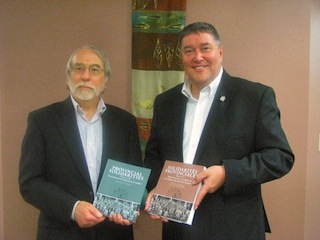Historian documents province s 100-year labour history
Author: Communications
Posted on Sep 16, 2013
Category: UNB Fredericton
 On September 11, 2013, Canadian historian and University of New Brunswick Professor David Frank presented Post-Secondary Education, Training and Labour Minister Danny Soucy with copies of his recently published book, Provincial Solidarities: A History of the New Brunswick Federation of Labour.
On September 11, 2013, Canadian historian and University of New Brunswick Professor David Frank presented Post-Secondary Education, Training and Labour Minister Danny Soucy with copies of his recently published book, Provincial Solidarities: A History of the New Brunswick Federation of Labour.
Dr. Frank's book was recently reviewed by Lori Gallagher of The Daily Gleaner.
The New Brunswick Federation of Labour celebrated its 100th anniversary on September 16, 2013.
To arrange a media interview, please contact Kelsey Seymour.
David Frank explores New Brunswick Federation of Labour's 100-year history
The Daily Gleaner (Fredericton)
Sat Sep 14 2013
Byline: LORI GALLAGHER
Author and professor David Frank's book is giving provincial history back to the people of the province.
Earlier this year, the University of New Brunswick history professor released Provincial Solidarities: A History of the New Brunswick Federation of Labour, but he says the book was a long time coming because it came out of a larger project that started in 2004 or 2005.
"It was a project to learn more about the history of work and the history of labour in this province. And it was a partnership between people at this university and the University of Moncton, and then there were six heritage institutions such as archives and museums, and there were six labour organizations including the Federation of Labour," he says. "It's a fairly broad project, and various theses were written, various events were held, various publications came out - some popular, some of them were more scholarly."
The book was an attempt to do what he describes as public history.
"That is to talk about things that are of importance and general interest and write them in a way that will appeal or be interesting to the general public as well as specialists."
The timing of the book couldn't be better because it coincides with the New Brunswick Federation of Labour's 100th anniversary on Monday, Sept. 16. The federation marked this milestone at its convention in the spring, where Frank spoke.
"By the end of that convention, when they were giving copies of the books away, they were calling it 'our' book," he says. "Which is nice for me as an author because this is not an official history. It's sympathetic, but not uncritical. There are things that are problems. Some of them they've overcome and some they didn't."
He says the book is a public history that tries to describe something important in the New Brunswick story.
"This is really a story about flesh-and-blood people who decided to create an organization, and there were only one or two examples in the country at that time of this kind of organization. British Columbia had one, but it went out of existence about 10 years later after it was set up in 1910. Then Alberta set one up in 1912, but there were no examples close at hand, and the New Brunswick Federation was actually third in the country and is today the second-oldest surviving one, bested by Alberta by only one year," says Frank.
"This is an organization that tried to give a common voice to workers and their unions in the province. It's not really a union, it's more an alliance of unions, and the kinds of things that pushed them to come together were issues such as what was then called a fair wage clause...But the biggest issue was really worker's compensation."
It was a long campaign that led to legislation in 1918. The present worker's compensation is a descendant of that early plan.
"That was just the first of their successes. There was more to come, and they continue to have an agenda to this day," he says.
Worker's compensation applies to everyone, union or not, he points out, as does minimum wage, the day of rest act, human rights legislation and other things that were initially brought in by "the agitation of the federation."
Frank believes there are several potential audiences for Provincial Solidarities: A History of the New Brunswick Federation of Labour.
"One of my editors on this book complained I was always putting people's names in when they maybe didn't need to be put in, but I think that was one of my missions, to mention as many people as possible," he says. "People who are descendants of those people and are participants in similar activities today will certainly learn something about how things were achieved."
He also thinks it's of general interest because it covers New Brunswick politics over a 100-year period. Plus it looks at how an organization can make a difference.
While some may view unions as being unchanging, he says, this book shows they are anything but, even if some of those changes are slow.
"If you go back to 1913, what you see there is 20 blue collar men from skilled trades," he says, while a meeting in 2013 involves several hundred people from all parts of the province, almost equal numbers of men and women, and both English and French represented.
Provincial Solidarities: A History of the New Brunswick Federation of Labour is available in both French and English and is published by Athabasca University Press in Alberta.
Lori Gallagher is a staff writer at The Daily Gleaner. She can be reached at gallagher.lori@dailygleaner.com.
